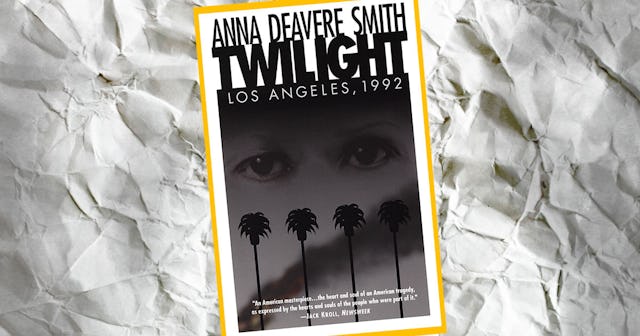Why 'Twilight: Los Angeles, 1992' Should Be At The Top Of Your Reading List

In college, I attended several classes where we discussed literature that came out after the ’92 Los Angeles riots. One work we studied was Twilight: Los Angeles, 1992. I know what you’re thinking: Does it have vampires in it? The answer is “no.” Not even close. It was published in ’94, long before Edward and Bella became a thing. This is the original Twilight, and it was nominated for the 1994 Tony Award for Best Play — and now, almost 30 years later, it might be the most relevant work I’ve ever read.
Twilight: Los Angeles, 1992 is a one-woman play written by Anna Deavere Smith, and it consists of real oral histories from people who lived through the riots. And when I say people, I mean she interviewed hundreds to find the right mix of varied perspectives.
For those of you who are too young to remember, the Los Angeles riots happened in the wake of the first Rodney King verdict, issued April 29, 1992, when four white Los Angeles Police Department officers were acquitted of charges of assault and police brutality in connection with King’s roadside arrest and beating on March 3, 1991.
I was nine years old when I first saw the clip of four police officers savagely beating an unarmed Rodney King, in the night, on the side of the road. It was a clip of real abuse at the hands of the police. It captured the world, and frankly, it is difficult to watch, even now, let alone to imagine that the police officers who committed the act would be cleared of any wrongdoing. When those police officers were acquitted, the nation was left to wonder how far, if at all, the country had traveled since the epidemic of urban race riots in the late 1960s. And in Los Angeles, the officers’ acquittal resulted in 60 long days of rioting.
Smith lays bare the voices of bystanders and commentators—the famous and the anonymous—to produce a diverse vision of this event, while also showing how troubled American race relations were at the close of the twentieth century. Public officials such as LAPD chief Daryl Gates and Congresswoman Maxine Waters are in this accounting, along with a nameless juror on the Rodney King police trial; various victims and instigators of violence in South Central, including white truck driver Reginald Denny, who was beaten; and residents of greater Los Angeles with their own view of the events. Smith memorized and delivered words in Korean to portray a Korean-American woman whose business had been burned down.
One element of this play that really stood out to me was how it is, in a very real sense, an historical document of a historic event — but at the same time, throughout the play, the 1965 Watts riot in Los Angeles (which prompted the McCone Commission to ameliorate conditions in black ghettos) is a point of reference. When I look back on Twilight: Los Angeles, 1992 and compare it to 2020, it is easy to realize that what happened to George Floyd, and the resulting protests and riots, is yet another sad and frustrating example of history repeating itself.
However, the most significant part of Twilight for anyone reading it now, in this moment, is an understanding that riots happen when people have had enough. They happen when a group of people have asked for help, asked for safety, asked for security, asked for the necessities of human life, but no one has listened. Riots happen when people keep saying the same thing calmly, when they have brought up injustice time and time again, in as many peaceful ways as possible, through protests, celebrities, and news coverage, but the message has fallen on deaf ears. They happen when the evidence of the injustice is clearly videotaped, but there are no convictions.
Those of you asking why a city is burning, I want you to read this play. And if reading isn’t your thing, you can watch clips of Smith performing it personally, online, for free. This is a one-woman play, and she does every single role. It’s remarkable, and entertaining, and heartbreaking. But more importantly, it is an exploration in empathy.
Twilight: Los Angeles, 1992 helped me, a white guy from rural Utah, to realize that riots happen when a group of people are unheard and unsafe, and their cries for justice are not taken seriously. They happen when the evidence of abuse is clearly there, on the screen, for everyone to see, and no one is held accountable. Twilight: Los Angeles, 1992 helped me realize the full scope of how this ugly history of racism continues to repeat itself, and that right now is the time to stand up and make it stop.
This article was originally published on